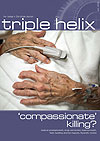In March 1993 David Lipskind, a Jewish Israeli Army reservist, was attacked at a bus stop in Nazareth by two Arabs wielding knives. Stabbed repeatedly, he staggered across the road and called out 'Brother – brother – help – I'm wounded!' His cry was heard by Tewfik Sheikh Sliman, a Nazarene taxi driver and Muslim Arab. Tewfik bundled David into his Mercedes and raced to the Emergency Room at the Nazareth Hospital.
The two clinicians principally responsible for saving David's life were an Arab Christian anaesthetist and a Muslim urologist. Both remain on staff to this day. David was dying – his abdomen full of blood due to a kidney puncture. While Dr Henry Hadad, the anaesthetist, clamped both the abdominal aorta and the inferior vena cava, Dr Basil Fahoum performed what a Jewish colleague later described as 'the fastest nephrectomy I have ever seen – no more than two or three minutes'. David became sufficiently stable to be transferred to a larger hospital in Haifa, where the staff later commented they were not confident they could have saved him.
Had David died, Nazareth would have been transformed from a quiet place where Christians, Muslims and Jews have always co-existed into a focus of inter-communal tension and fear. As it was, evil was turned to blessing as the staff of this Christian hospital, at the heart of the largest Arab town in the Jewish state, showed that hatred and violence need not win.
Two months after David was discharged, Tewfik's father threw a party to celebrate his return to health. Dr Fahoum and Tewfik were honoured by the governments of both Israel and Jordan by being invited to attend the signing of the Peace Treaty between the two countries in 1994.
Nazareth Hospital EMMS / School of Nursing
In 1861 a visionary Christian doctor called Kaloost Vartan arrived in Nazareth and set up a 4-bed clinic. This became an expatriate medical mission belonging to the Edinburgh Medical Missionary Society and is now a modern general hospital, staffed by Israeli citizens. The EMMS was wound up in 2001, but remains registered in Scotland as an independent charity known as 'the Nazareth Trust'. Today our 25 acre site is home to a hospital, an excellent School of Nursing, and the 'Nazareth Village'. The hospital has 147 beds, a catchment of around 250,000 and 50,000 A&E visits per year (many more per inpatient bed than any other hospital in Israel).
The School is about to start delivering Nursing BA degrees. Local families are happy to have their daughters enrol as students because they see the caring pastoral ethos. Thus 70% of the student body are young Muslim women, who are taught the medical ethics which will underpin their careers from a specifically Christian perspective.
Living reconciliation
How does a medical mission remain relevant in the 21st century? Every case is unique. Answers will depend on the context of the ministry as well as the services it provides. Any ministry which retains relevance will have an essential feature which sets it apart from humanitarian endeavours.
Our campus overlooks the town, and many years ago acquired the name 'the holy hill'. Under Ottoman, British and now Israeli rule, we have welcomed and treated all, irrespective of background, and have gained the trust, affection and respect of all groups. Today, Jew, Muslim, Druze and Christian are all represented among both staff and patients. Thus – working as we always have 'in the name of Jesus' – we live out a testimony of peace, collaboration, co-existence and mutual respect which has much to offer the Holy Land. Put shortly, 'we live reconciliation'.
'Living reconciliation' is hard to analyse, but easy to describe. It is the Muslim nurse screening Ethiopian Jewish immigrants for tuberculosis, the Chaplain befriending an elderly Bedouin patient, Muslim nurses and families joining with Christians carolling on Christmas Eve in the paediatric ward. In June 2009, the ultra-Orthodox-Jewish Israeli Health Minister, the (Arab) Anglican Bishop of Jerusalem, and our Muslim operating room manager were joined by the US and British Ambassadors at the cutting of the ribbon when we opened a new surgical complex.
Going forward
We want to remain valid, relevant and vibrant to the end of our second century in Nazareth, and beyond. We need to remain true to our distinctive heritage and to develop. We want to ensure Christ remains at the centre of each strand of our service; to make best use of our land and resources as we 'Heal, Teach and Serve'; and to 'build bridges' between Christians in the Holy Land and Christians elsewhere, to bless those outside Israel and to support our work.
2,000 years ago Nazareth was home to God made flesh – Jesus Christ. Today we work in his name to demonstrate his unconditional love in ways which seek to make a uniquely Christian difference to his home town.
reference
1. John 1:46 (NKJV)
































